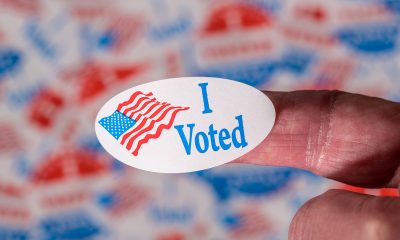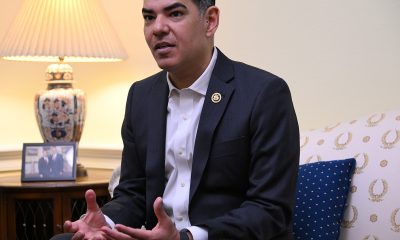News
Leahy withholds amendments for gay couples in immigration bill
In tearful speeches, Dems says time is wrong for measures
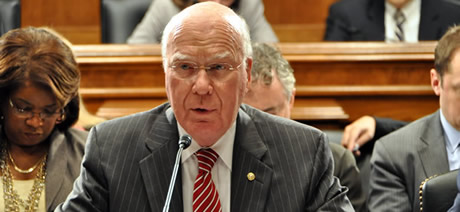
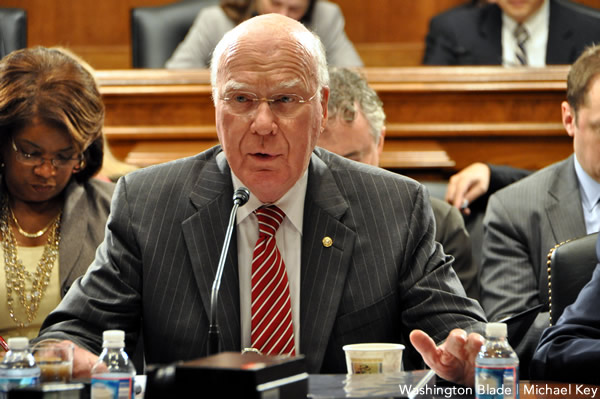
Sen. Patrick Leahy (D-Vt.) withheld UAFA as a committee amendment. (Blade file photo by Michael Key)
Senate Judiciary Committee Chair Patrick Leahy (D-Vt.) on Tuesday withheld amendments to include gay couples as part of immigration reform in the aftermath of speeches — sometimes tearful — from Democrats on the panel who said they couldn’t support the measures.
After an extended speech on why he believes discrimination against gay couples is wrong — Leahy said “with a heavy heart” he wouldn’t introduce the amendments before the Senate Judiciary Committee. They would have made bi-national same-sex couples equal under the law to straight couples for immigration purposes.
“In the immigration context, if you’re an American and fall in love will someone of the same sex from a different country and you get married legally, your spouse will not be treated like any other immigrant spouse would be by your federal government,” Leahy said. “My amendments would change that. I don’t want to be the senator who asks Americans to choose between the love of their life and the love of their country.”
During his remarks, Leahy asked members of the “Gang of Eight” who produced the base bill and were also members of the Senate Judiciary Committee why they decided to exclude gay couples from the initial legislation.
Under current law, gay Americans are unable to sponsor their foreign partners for residency in the United States — even if they’re married — unlike straight Americans. For couples that are married, that’s because of the Defense of Marriage Act, which prohibits federal recognition of same-sex marriage. LGBT advocates had been pushing Congress to rectify this issue as part of comprehensive immigration reform.
Two amendments were proposed by Leahy. One mirrored the Uniting American Families Act, which would enable gay Americans to sponsor their foreign partners for residency in the United States. The other would have allowed for the approval of marriage-based green card applications for married same-sex couples.
Democrats who are known for being LGBT rights supporters — Sens. Chuck Schumer (D-N.Y.), Al Franken (D-Minn.), Dianne Feinstein (D-Calif.) and Richard Durbin (D-Ill.) — said they were torn on the issue, but couldn’t support the amendments out of fear they would lose Republican support and it would kill the legislative package.
Feinstein said the Supreme Court, which is currently considering the constitutionality of DOMA, may make the issue “moot” because a ruling against the anti-gay law in June would end federal discrimination against married same-sex couples.
“We now know that this is going to blow the agreement apart,” Feinstein said. “I don’t want to lose Sen. Graham’s vote because Sen. Graham’s vote can represent and be used as the rationale for dozens of other [lawmakers] who then will not vote for the immigration bill. … I am for what Sen. Leahy is proposing, I would just implore to hold off on this amendment at this time.”
Schumer, a member of the “Gang of Eight,” said he tried to persuade other senators to support the idea and believes current law is “rank discrimination,” but can’t bring himself to support the amendments because of Republican opposition.
“If we make the effort to add it to this bill, they will walk away,” Schumer said. “They’ve said it publicly, they’ve told me privately — I believe them. The result: no equality, no immigration bill. Everyone loses.”
Prior to the vote, Schumer was targeted by LGBT groups for being the only Democrat on the committee to not voice support for including UAFA as part of the larger package.
Durbin was particularly emotional and had tears in his eyes as he explained why they couldn’t support the measures. A member of the “Gang of Eight,” Durbin said he supports UAFA, but doesn’t see immigration reform as the best vehicle for the measure.
“I believe in my heart of hearts that what you’re doing is the right and just thing … but I believe this is the wrong moment, this is the wrong bill,” Durbin said. “There are approximately 250,000 LGBT undocumented immigrants in America that would benefit from passage of immigration reform. I want to make certain they have that chance.”
LGBT rights groups responded to the committee’s exclusion of same-sex couples from immigration reform with vocal disappointment.
Rachel Tiven, executive director of the LGBT group Immigration Equality, attended the markup and — while she said she’s “proud’ of Leahy for his support — expressed frustration with other Democrats.
“I’m very proud of Sen. Leahy; I’m very dismayed that his colleagues did not stand up with him to talk about the dignity of LGBT immigrant families,” Tiven said. “Only Sen. Leahy talked about the LGBT immigrants that he represents who have dreams, too, and who want to see a good bill passed that will help everyone, and who need immigration reform as badly as any other immigrant.”
Tiven named Democrats on the panel with whom she was particularly disappointed because of their previously articulated support for the LGBT community.
“To hear Sen. Durbin say, ‘Well, this is an outside issue like gun control,’ to hear that Sen. Franken didn’t speak up for families like Ginger and Ness Madeiros, whose visa runs out in August — what are they and their eight-month-old son going to do?” Tiven said. “I can’t imagine how they’re feeling right now about Sen. Franken. How could he not say these are immigrant families, too?”
With the exception of Schumer, Tiven maintained the Democrats on the panel expressed support for including same-sex couples in the reform package, which made their statements during the committee markup surprising.
But Republican members of the panel were most opposed to including the measures. They reiterated their opposition to including the measure in the package and said adopting them would break apart the coalition that helped put it together.
Sen. Lindsey Graham (R-S.C.), a Republican member of the “Gang of Eight,” said the legislation would lose support from evangelical Christians and the Catholic Church, who’ve supported the measure, if those protections were included.
“I support traditional marriage without animosity,” Graham said. “I’m not married; I guess that means maybe I shouldn’t speak at all about it, but I do believe that the people of my state, and the people of other states who have gone different ways than Vermont, believe it would throw the coalition out of balance.”
When Leahy asked Graham if anything in the amendments would require South Carolina to change its state law on marriage, Graham said no, but maintained it would be making him vote in favor of a concept he opposes.
“You got me on immigration; you don’t got me on marriage,” Graham said. “I can’t just tell any more directly; you want to keep me on immigration; let’s stay on immigration.”
Sen. Jeff Flake (R-Ariz.), another GOP member of the “Gang of Eight,” also said he expected the coalition that put the bill together to fall apart if same-sex couples were included.
“This is an issue that is being addressed by the courts right now, I think that it would certainly upset the coalition that we have,” Flake said. “Certainly, we in Arizona, like in South Carolina, have spoken on the issue. It would certainly mean that this bill would not move forward. That would be a real shame, given how far we’ve come and the work that’s gone into this.”
Winnie Stachelberg, vice president of external affairs at the Center for American Progress, pointed at Republicans as the reason why same-sex couples weren’t included in the legislation.
“We’re all disappointed that at this juncture in the process, a small handful of Republicans prevented the provision from being voted on, but we’ve got a long way to go in the process and we’ll continue to work hard to secure the votes on the floor if it comes up,” Stachelberg said.
Following the discussion on the Leahy amendments, the committee reported out the legislation by a 13-5 vote. Supporters of immigration reform in the room — largely members of immigrant community — chanted, “Yes we can! Yes we can!” and embraced senators who voted in favor of the legislation as they snapped photos with them.
According to a report from the Williams Institute, an estimated 275,000 undocumented LGBT Americans would have a path to citizenship as the legislation currently stands if it reaches President Obama’s desk and is signed into law.
In a statement after the vote, Obama, who called for a gay-inclusive bill as part of his vision for reform, commended the committee for completing work on the legislation and urged a floor vote as soon as possible.
“None of the committee members got everything they wanted, and neither did I , but in the end, we all owe it to the American people to get the best possible result over the finish line,” Obama said. “I encourage the full Senate to bring this bipartisan bill to the floor at the earliest possible opportunity and remain hopeful that the amendment process will lead to further improvements.”
Leahy’s announcement came after an Associated Press report saying the White House had asked the Vermont senator to hold off on offering the amendments until the measure goes before the full Senate.
It’s unclear whether Leahy will introduce the amendments once the legislation reaches the Senate floor, which is expected early in June. Passage on the Senate floor would be significantly more difficult than passage would have been in committee if a 60-vote threshold is necessary to overcome a filibuster.
After the committee reported out the bill, the Washington Blade asked Sen. Chuck Schumer (D-N.Y.) whether he wants to see UAFA brought up as an amendment on the Senate floor.
“You’ll have to ask Sen. Leahy about that,” Schumer replied. “As you heard, I believe strongly in UAFA. I don’t think I have to say anything more; I spoke long enough on it.”
Although the amendment for same-sex couples wasn’t included, the committee on Monday rejected an amendment that would have removed a provision supported by LGBT advocates that was included in the base bill.
Sen. Charles Grassley (R-Iowa) offered two amendments that would have eliminated the repeal of the one-year filing deadline for asylum seekers. One amendment failed on a vote of 6-12 and the other failed on a vote of 9-9.
LGBT advocates had supported that provision in the base bill because LGBT asylum seekers often don’t know they have a one-year deadline to apply for asylum in the United States, or lack financial resources to make the application.
District of Columbia
Reenactment of 1965 gay rights protest at White House set for April 17
Event to mark 60th anniversary of historic picketing

D.C.’s Rainbow History Project is inviting members of the local LGBTQ community and its supporters to participate in a reenactment of what it calls the historic 1965 first gay rights protest outside the White House.
The event is scheduled to begin at 4 p.m. Thursday, April 17 on the sidewalk in front of the White House.
In a statement, Rainbow History Project says the 1965 protest was organized by local gay rights pioneers Frank Kameny and Lilli Vincenz on behalf of the Mattachine Society of Washington, one of D.C.’s first gay rights groups that Kameny co-founded in the early 1960s.
“Led by Dr. Kameny and Dr. Vincenz, picketers demanded action on the Mattachine Society’s four major issues: the exclusion of homosexuals from Federal employment; the punitive policies of the U.S. Military; blanket denial of security clearances to gay people; and government refusal to meet with the LGBTQ community,” the statement says.
The statement referred to the titles of Kameny and Vincenz in connection with their academic doctorate degrees
“Although Dr. Kameny died in 2011, and Dr. Vincenz in 2023, Rainbow History Project and its all-volunteer corps will picket in their honor and demonstrate there is a new generation of young activists ready to take up their signs and their fight for equal rights for all LGBTQ people,” the statement says.
Among those expected to participate in the April 17 White House reenactment picketing is longtime D.C. LGBTQ rights advocate Paul Kuntzler, who is the last known survivor of the 1965 White House gay rights protest. Kuntzler was expected to carry a picket sign similar to the one he carried in 1965.
In its research on the 1965 gay White House protest, Rainbow History Project learned of a letter that Kameny sent to then President Lyndon B. Johnson outlining the demands of the White House protesters.
“We ask, Mr. President, for what all American citizens – singly and collectively – have the right to ask,” the Kameny letter states. “That our problems be given fair, unbiased consideration…consideration in which we, ourselves, are allowed to participate actively and are invited to do so.”
The RHP statement says the group “will carry replicas of the original protest signs and hand out literature explaining the picket to passersby and tourists.”
Myanmar
LGBTQ advocacy group joins Myanmar earthquake relief effort
March 28 quake killed thousands, devastated country’s second-largest city

A powerful earthquake that rocked Myanmar on March 28 unleashed devastation across the central part of the country.
The U.S. Geological Survey measured the quake at 7.7, and pinpointing its epicenter roughly 10 miles west of Mandalay, the country’s second-largest city. A 6.4-magnitude aftershock jolted the area 12 minutes later, compounding the destruction and deepening the crisis for a nation already strained by conflict.
The earthquake struck with terrifying intensity near its epicenter, wreaking havoc on Mandalay and the nearby city of Sagaing.
Mandalay, a bustling city of approximately 1.5 million residents, bore the brunt of the destruction. Among the most striking losses was the 12-story Sky Villa Condominium, which collapsed, leaving scores trapped beneath the wreckage. Rescue workers scrambled to pull survivors from the rubble, but the rising death toll underscored the tragedy’s magnitude.
In Sagaing, which is located closer to the epicenter, more than 70 percent of buildings sustained damage. The Ava Bridge, an essential artery spanning the Irrawaddy River, collapsed, cutting off a critical connection to Mandalay. The earthquake’s shallow depth of less than seven miles amplified its power, reducing homes, temples, and schools to rubble.
The earthquake’s death toll continues to climb, with at least 3,649 confirmed dead, more than 5,000 injured, and approximately 145 people missing. Amid the widespread devastation, questions loom about the impact on vulnerable populations. The Washington Blade reached out to Colors Rainbow, an organization advocating for LGBTQ rights in Myanmar, to understand how the crisis has affected one of the nation’s most marginalized communities.
Colors Rainbow Executive Director Hla Myat Tun spoke about how his organization is working to address the crisis faced by Myanmar’s LGBTQ community in the aftermath of the earthquake.
Colors Rainbow has implemented a system of multipurpose cash transfers, directing funds to local LGBTQ partner organizations. These grassroots partners, in turn, provide essential support to affected individuals that includes emergency cash assistance, food, non-food items, clean water, and basic emotional support tailored to the immediate needs of their communities.
“We estimate that around 500–800 LGBTQ individuals have been impacted in the affected areas, particularly in Mandalay Region, Sagaing Region, and southern Shan state,” said Hla Myat Tun. “So far, we have been able to directly assist around 80–100 LGBTQ individuals.”
Hla Myat Tun told the Blade that Colors Rainbow is actively gathering data to assess the specific challenges that LGBTQ people are facing in the aftermath of the earthquake.
Preliminary observations, he noted, point to heightened vulnerability among LGBTQ people, driven by social exclusion and limited access to mainstream humanitarian aid. Hla Myat Tun, however, emphasized more comprehensive information is necessary to fully understand the scope of their needs and vulnerabilities in this crisis.
“We are partnering with international LGBTQ and feminist organizations that focus on displaced communities,” said Hla Myat Tun. “These partners provide emergency funds, and we coordinate with local LGBTQ groups to deliver aid directly to affected individuals on the ground.”
Addressing reports of military restrictions on humanitarian aid, Hla Myat Tun explained how Colors Rainbow is managing to reach LGBTQ people who are in conflict zones and areas the military junta controls. Hla Myat Tun highlighted the importance of the organization’s trusted local LGBTQ partners, who are embedded in these regions. Their presence and established networks, he said, are vital in navigating restricted areas and ensuring that aid reaches the LGBTQ people who are most in need.
Hla Myat Tun also provided insight into how Colors Rainbow is tailoring its relief efforts to meet the LGBTQ community’s specific needs.
He said his organization is gathering information directly from LGBTQ people through close coordination with its local partners, relying on both formal and informal communication channels. Hla Myat Tun told the Blade his team conducts daily check-ins via quick telephone calls, ensuring a continuous flow of information to guide their response efforts despite limited internet access, electricity and other challenges.
“Our approach is collaborative — we set strategies and share responsibilities to respond flexibly and safely, based on the rapidly changing local context,” he said. “Personal stories are being documented, but for security reasons, we are cautious about sharing them publicly.”
When asked whether staff or volunteers had harassment, discrimination, or violence while delivering aid — a concern given the precarious legal and social climate for LGBTQ people in Myanmar — Hla Myat Tun said there have been no reported incidents thus far.
“So far, we haven’t received any reports from our staff or local partners about harassment or violence while delivering aid,” he noted, emphasizing Colors Rainbow remains vigilant and has implemented robust safety protocols to protect all involved.
Colors Rainbow relies primarily on funding from international LGBTQ-focused partners. He noted, however, humanitarian funding specifically dedicated to LGBTQ communities remains vastly under-resourced, relative to the pressing needs on the ground. Hla Myat Tun said this shortfall severely limits the scale and reach of Colors Rainbow’s efforts.
“While Myanmar’s legal framework remains outdated, societal attitudes — especially during the civilian government — have shown signs of progress,” said Hla Myat Tun. “We have seen positive change thanks to the work of local LGBTQ organizations.”
“In the current crisis, many communities are working together despite legal barriers. However, in areas without LGBTQ-led organizations, inclusive humanitarian responses are still lacking,” he added. “There’s an urgent need for international humanitarian actors to understand and implement LGBTQ-inclusive practices in Myanmar.”
When asked about long-term strategies to support the recovery and resilience of LGBTQ communities as Myanmar rebuilds, Hla Myat Tun affirmed Colors Rainbow is deeply committed to fostering resilience. The organization’s initiatives include leadership development, community empowerment through training and workshops, sub-granting programs, and organizational development support. He also highlighted Colors Rainbow’s advocacy for LGBTQ-inclusive policies and collaboration with ethnic groups to promote an inclusive federal democracy, and specifically thanked Outright International, a global LGBTQ and intersex rights group, for “amplifying our work.
“This kind of international attention shines a spotlight on the challenges LGBTQ communities in Myanmar are facing and helps open doors for more support,” Hla Myat Tun told the Blade. “It also boosts visibility and solidarity, both locally and globally, which we deeply appreciate.”
Hungary
Hungarian MPs amend constitution to ban public LGBTQ events
Viktor Orbán’s government spearheaded amendment

Hungarian MPs on Monday voted to amend their country’s constitution to ban public LGBTQ events.
The vote took place less than a month after lawmakers banned Pride events and gave authorities the green light to use facial recognition technology to identify those who participate in them.
The Associated Press notes MPs approved the constitutional amendment — which Prime Minister Viktor Orbán’s Fidesz-KDNP coalition government proposed — by a 140-21 vote margin. Authorities before the vote removed a group of protesters who tried to block the entrance to a parliament parking garage.
Orbán’s government over the last decade has moved to curtail LGBTQ and intersex rights in Hungary.
A law that bans legal recognition of transgender and intersex people took effect in 2020. Hungarian MPs that year also effectively banned same-sex couples from adopting children and defined marriage in the constitution as between a man and a woman.
An anti-LGBTQ propaganda law took effect in 2021. The European Commission sued Hungary, which is a member of the European Union, over it.
MPs in 2023 approved the “snitch on your gay neighbor” bill that would have allowed Hungarians to anonymously report same-sex couples who are raising children. The Budapest Metropolitan Government Office in 2023 fined Lira Konyv, the country’s second-largest bookstore chain, 12 million forints ($33,115.76), for selling copies of British author Alice Oseman’s “Heartstopper.”
Former U.S. Ambassador to Hungary David Pressman, who is gay, participated in the Budapest Pride march in 2024 and 2023. Pressman was also a vocal critic of Hungary’s anti-LGBTQ crackdown.
The Washington Blade has reached out to Budapest Pride for comment on the constitutional amendment.
-

 Opinions4 days ago
Opinions4 days agoIt’s time for new leadership on the Maryland LGBTQIA+ Commission
-

 The White House4 days ago
The White House4 days agoWhite House does not ‘respond’ to reporters’ requests with pronouns included
-

 Noticias en Español5 days ago
Noticias en Español5 days agoINDIGNACIÓN: ¡El transfeminicidio de Sara Millerey en Colombia nos cuestiona como sociedad!
-
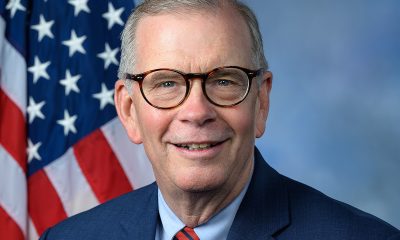
 Congress5 days ago
Congress5 days agoHouse Republicans advance two anti-trans education bills

